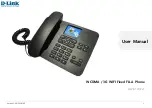
PROGRAMMED STATION MESSAGES
Any station may select one of 15 messages to be displayed at a calling party’s keyset to advise others of their
status. Ten messages are factory-programmed but may be reprogrammed. Five can be created by the system
administrator. Each display keyset user may create five additional messages unique to them.
NOTE: The calling party must have a display keyset to view these messages.
PROTECTION FROM BARGE-IN
Each station can be programmed as secure or not secure. Secure stations cannot be barged-in on. A station
that is not secure cannot be barged-in on when talking to a secure station.
REDIAL
There are three types of external redial available to all station users. Each type can redial up to a maximum of
18 digits.
•
AUTO RETRY—When an outside number is dialed and a busy signal is received, the auto retry feature can
be used to reserve the outside line and automatically redial the number for a programmable number of
attempts (available to keyset users only).
•
LAST NUMBER—The most recently dialed number on a C.O. line is saved and may be redialed by press-
ing the redial key or dialing the LNR access code.
•
MANUAL RETRY with LNR—When you make an outside call and receive a busy signal you can press the
LNR key to redial the same number again. This operation can be manually repeated for a limited number
of attempts as defined by system programming (available to keyset users only).
•
MEMO REDIAL—When you are calling directory assistance you can store the number you are given using
the dial pad and SAVE number feature. There is no need for a pencil and paper (available to keyset users
only).
•
SAVE NUMBER—Any number dialed on a C.O. line may be saved for redial at a later time.
REMOTE HOLD
When you wish to place a call on hold at another station, press TRSF and dial the station number (or press the
appropriate DSS key). Press the HOLD key. This will place the call on system hold on an available CALL button
or Line Key at the remote station.
RING MODES
Each keyset user can select one of three distinct ways to receive intercom calls. The phone can automatical-
ly answer on the speakerphone, voice announce through the speaker or receive ringing.When the ring mode
is selected, keyset users can choose one of eight distinct ring tones. Forced Auto Answer is invoked by the
calling station and is controlled by the calling station’s class of service.
RINGING PREFERENCE
Lifting the handset or pressing the speaker button automatically answers a call ringing at the keyset. Using
this method, users are assured of answering the oldest call first. When ringing preference is turned off, the
user must press the flashing button to answer. Users may answer ringing lines in any order by pressing the
flashing button.
4.37
Home Page
















































